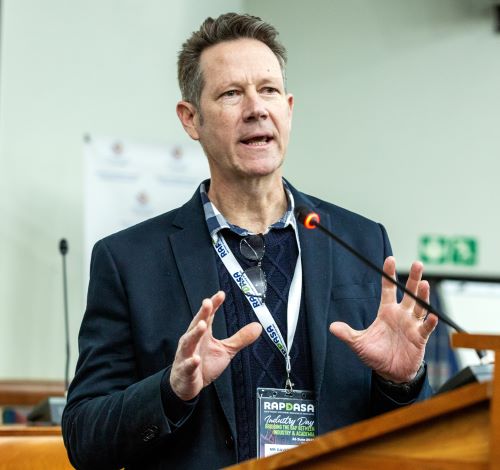by Mosima Rafapa
An industry day between the Rapid Product Development Association of South Africa (RAPDASA) and the Tshwane University of Technology’s (TUT) Faculty of Engineering and the Built Environment (FEBE), focused on bridging the gap that has traditionally separated higher education institutions from the wider manufacturing industry was held on 26 June 2025 in an effort to strengthen connections between academic research and industrial practice.
Held at the Pretoria Campus, the event brought together industry leaders, researchers, innovators and students to discuss the need for universities to produce impactful research that addresses industry challenges and supports sustainability. An expert panel also explored aligning academic research with industrial priorities for economic and practical benefits.
Delivering the opening remarks, Dr Vathiswa Papu-Zamxaka, Deputy Vice-Chancellor for Research, Innovation and Engagement, emphasised the need to integrate global frameworks such as the Fourth Industrial Revolution (4IR) and the United Nations’ Sustainable Development Goals (SDGs) into research and development agendas. “These themes are not merely academic concepts; they are essential to fostering inclusive, sustainable and resilient societies. It is this vision that underpins the RAPDASA/TUT Industry Day, a vital platform for collaboration across institutions.”
“The mission of institutions of higher learning extends beyond education. We are obliged to collaborate with industry to co-create impactful solutions and prepare employable, future-focused, resilient and globally competitive graduates,” she said. “Through robust dialogue, strategic networking and showcasing innovative student projects, we seek to cultivate enduring partnerships and inspire ideas that contribute meaningfully to our country’s industrial growth.”

Deputy Vice-Chancellor for Research, Innovation, and Engagement, Dr Vathiswa Papu-Zamxaka, at an Industry Day hosted by TUT’s FEBE and RAPDASA
In his keynote address, David Bullock, Managing Director of Rapid 3D at RAPDASA, provided an in-depth overview of Africa’s evolving manufacturing landscape. Focusing on 3D printing and advanced manufacturing, Bullock traced the history of his company and highlighted the critical challenges and opportunities facing the sector. He noted that South Africa has achieved considerable progress in Additive Manufacturing (AM), with RAPDASA playing a critical role in raising awareness of AM’s transformative potential in solving real-world problems.
“Additive Manufacturing has been present in South Africa for longer than two decades. Our mission is to continually demonstrate our relevance in promoting inclusive industrial transformation,” Bullock remarked.

David Bullock, Managing Director of Rapid 3D at RAPDASA, delivers the keynote
Dr Hamilton Mphidi, Director of the Technology Transfer Office at the University of Johannesburg, spoke passionately on the need for a strategic realignment between academic research and industry requirements. Stressing the importance of partnerships that extend beyond Small, Medium and Micro Enterprises (SMMEs), he advocated for collaboration with large-scale industry players to ensure research has a broader societal impact.
“There is still a significant gap between academia and industry in South Africa. To close this gap, research outputs must align with real-world needs. Strategic partnerships, targeted funding and practical application are the three pillars upon which effective collaboration can be built,” Dr Mphidi argued.
He encouraged universities to engage industry partners at the earliest stages of research design, thereby ensuring relevance and mutual benefit. “We must start with the problem, defined in partnership with industry and move towards joint solution development. Once intellectual property is protected, universities should work with industry to publish, license and commercialise that research.”

Dr Hamilton Mphidi, Director of the Technology Transfer Office at the University of Johannesburg, delivers the second keynote
Prof Thomas Olwal, Acting Assistant Dean for Postgraduate Studies, Research and Innovation at FEBE, closed the formal proceedings by reflecting on the need to remove institutional bottlenecks that hinder agile collaboration. “As we plan for the next RAPDASA Industry Day, it is essential to reflect on past progress while eliminating bureaucratic barriers that stall innovation. The urgency to co-identify relevant challenges, co-create ideas and co-develop, co-manufacture and co-commercialise solutions, has never been greater.”

FEBE’s Acting Assistant Dean for Postgraduate Studies, Research and Innovation, Prof Thomas Olwal

Industry leaders, academic researchers, innovators and students at Industry Day last Thursday.
